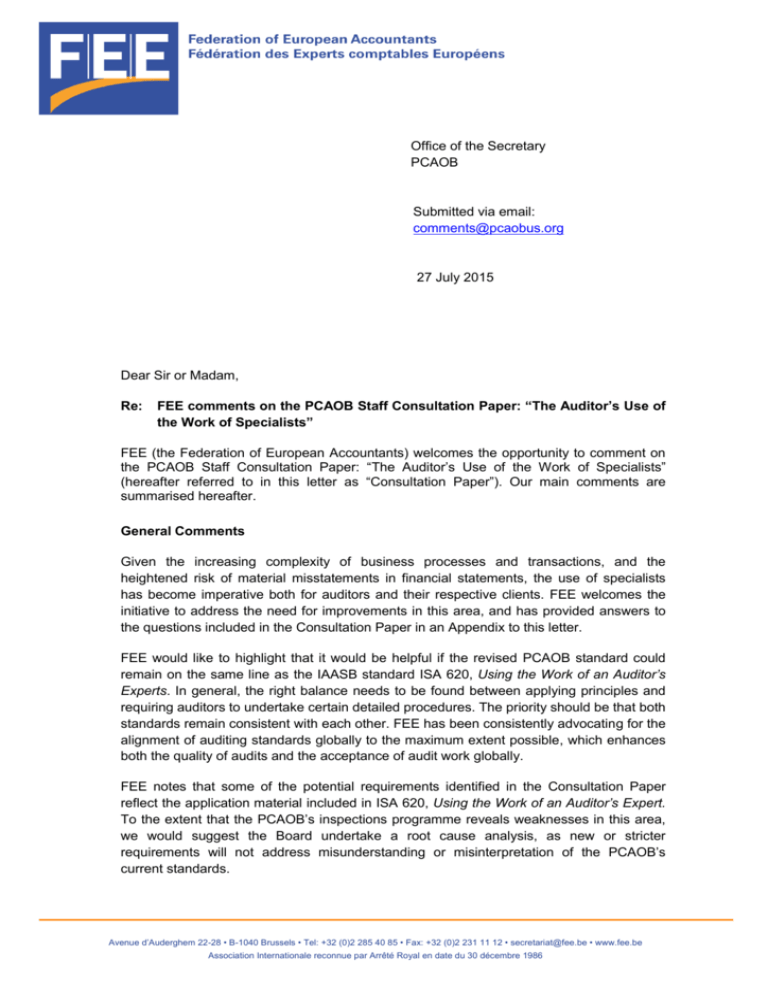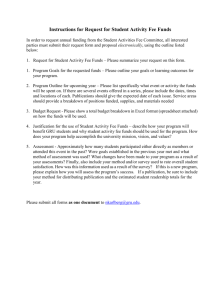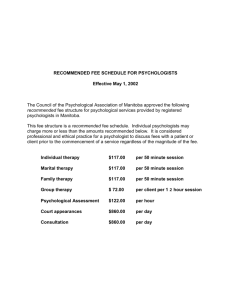FEE comment letter and responses to the PCAOB Staff Consultation
advertisement

Office of the Secretary PCAOB Submitted via email: comments@pcaobus.org 27 July 2015 Dear Sir or Madam, Re: FEE comments on the PCAOB Staff Consultation Paper: “The Auditor’s Use of the Work of Specialists” FEE (the Federation of European Accountants) welcomes the opportunity to comment on the PCAOB Staff Consultation Paper: “The Auditor’s Use of the Work of Specialists” (hereafter referred to in this letter as “Consultation Paper”). Our main comments are summarised hereafter. General Comments Given the increasing complexity of business processes and transactions, and the heightened risk of material misstatements in financial statements, the use of specialists has become imperative both for auditors and their respective clients. FEE welcomes the initiative to address the need for improvements in this area, and has provided answers to the questions included in the Consultation Paper in an Appendix to this letter. FEE would like to highlight that it would be helpful if the revised PCAOB standard could remain on the same line as the IAASB standard ISA 620, Using the Work of an Auditor’s Experts. In general, the right balance needs to be found between applying principles and requiring auditors to undertake certain detailed procedures. The priority should be that both standards remain consistent with each other. FEE has been consistently advocating for the alignment of auditing standards globally to the maximum extent possible, which enhances both the quality of audits and the acceptance of audit work globally. FEE notes that some of the potential requirements identified in the Consultation Paper reflect the application material included in ISA 620, Using the Work of an Auditor’s Expert. To the extent that the PCAOB’s inspections programme reveals weaknesses in this area, we would suggest the Board undertake a root cause analysis, as new or stricter requirements will not address misunderstanding or misinterpretation of the PCAOB’s current standards. Avenue d’Auderghem 22-28 • B-1040 Brussels • Tel: +32 (0)2 285 40 85 • Fax: +32 (0)2 231 11 12 • secretariat@fee.be • www.fee.be Association Internationale reconnue par Arrêté Royal en date du 30 décembre 1986 Page 2 of 5 As per the consultation, in order to use the opinion and work of a specialist engaged or employed by the client, the auditor may need to engage their own specialists. FEE believes that a risk-based approach is essential in this context and is concerned about unintended consequences of the proposed PCAOB approach: if auditors are required to treat the information prepared by these specialists as if prepared by the audited company, companies may stop engaging their own specialists and just rely upon the numbers that the auditor’s specialist produces which, for instance for independence reasons, cannot be the intension. Our detailed responses to the questions stated in the Consultation Paper are set out below. For further information on this FEE1 letter, please contact Hilde Blomme on +32 (0)2 893 33 77 or via email at hilde.blomme@fee.be or Noémi Robert on +32 (0)2 893 33 80 or via email at noemi.robert@fee.be from the FEE team. Yours sincerely, Petr Kriz FEE President Olivier Boutellis-Taft FEE Chief Executive 1 FEE is the Fédération des Experts comptables Européens (Federation of European Accountants). It represents 47 professional institutes of accountants and auditors from 36 European countries, including all 28 EU member states. In representing the European accountancy profession, FEE recognises the public interest. It has a combined membership of more than 800,000 professional accountants working in different capacities in public practice, small and large firms, government and education – all of whom contribute to a more efficient, transparent and sustainable European economy. Avenue d’Auderghem 22-28 • B-1040 Brussels • Tel: +32 (0)2 285 40 85 • secretariat@fee.be • www.fee.be Association Internationale reconnue par Arrêté Royal en date du 30 décembre 1986 Page 3 of 5 Appendix: Responses to Questions Questions 1-6: Current Requirements and Current Practice The information included in the Consultation Paper satisfactorily reflects the current practices in larger audit firms. FEE agrees with the PCAOB that in the areas covered by the PCAOB standards relating to Auditing Accounting Estimates, Auditing Fair Value Measurements and Disclosures, and Auditing Derivative Instruments, Hedging Activities, and Investments in Securities, the use of specialist knowledge or skill in relevant areas has increased in recent years. The Consultation Paper classifies specialists into four groups. FEE would support a practice which is in line with ISA 620, Using the Work of an Auditor’s Expert, where evidence provided by a specialist employed/engaged by the client (‘management’s specialist’) should be treated differently than the one obtained by an independent expert or an expert engaged or otherwise employed by the audit firm (‘auditor’s specialist’). This is based on the fact that a specialist who is engaged or otherwise employed by the client is working on behalf of the client. Whereas we appreciate the need for a distinction in categories for the purposes of a scalable approach, we question the need to consider four different categories. Questions 7-8: Potential need for improvement FEE welcomes the continuous evaluation of standards, and identification of issues to be addressed and improved. We note that it is discussed in the Consultation Paper that, in order to use the opinion and work of a specialist engaged or employed by the client, the auditor may need to engage their own specialists to evaluate this work. We believe that a risk-based approach is essential in this context, because a requirement in every case would result in an additional cost without significant increases in audit quality; this could have a more far-reaching effect for Small Medium Practices (SMPs) than for larger audit firms, and could also drive client behaviour in terms of the selection of specialists. Avenue d’Auderghem 22-28 • B-1040 Brussels • Tel: +32 (0)2 285 40 85 • secretariat@fee.be • www.fee.be Association Internationale reconnue par Arrêté Royal en date du 30 décembre 1986 Page 4 of 5 Questions 9-18: Alternative regulatory approaches We support the PCAOB view that the Board should be proactive in addressing auditors’ dealings with specialists by means of its standard setting activities as an alternative to devoting additional resources to inspections and enforcement of existing standards. In terms of investor protection, action to prevent weaknesses occurring in the conduct of the audit is far more appropriate than the retrospective identification of weaknesses that have already occurred. However, this does not imply that every issue is susceptible to resolution through auditing standards; those that are not should be addressed by other means. With regards to auditor’s specialists, FEE supports the first alternative to develop a standard for using the work of an auditor’s specialist, as similar to the approach used by the IAASB in ISA 620. We see the benefit of a scalable approach, taking into account practical differences between an engaged specialist and an employed specialist. In our view, a principle-based approach recognising practical differences, but setting a common objective, is appropriate. With regards to company’s specialists, FEE concurs with the alternative whereby the Board would rescind the parts of AU sec 336 that relate to company specialists, and then mirror the approach taken in ISA 500, Audit Evidence. FEE firmly believes that the auditor’s risk assessment in the area of assessing the objectivity and competence of a company’s specialist should determine the need for, and nature of, further audit procedures. Even if it is standard practice for auditors to perform specific procedures to evaluate the work of specialists, requirements need to be drafted in a way that allows flexibility to accommodate individual audit circumstances. Questions 19-21: Potential Amendments - Definitions Whilst FEE considers the exclusion of income tax and IT from the work of specialists as the right approach, based on the premise that these individuals are always part of the engagement team, we believe that consideration should be given to widening this to other specialists and making it more principle based. For example, on all insurance audits actuaries are key members of the engagement team and would be seen as no different from tax or IT specialists. Avenue d’Auderghem 22-28 • B-1040 Brussels • Tel: +32 (0)2 285 40 85 • secretariat@fee.be • www.fee.be Association Internationale reconnue par Arrêté Royal en date du 30 décembre 1986 Page 5 of 5 Questions 22-39: Potential Amendments - Auditor’s Employed or Engaged Specialist We agree that any revisions to the PCAOB standards should continue to require the auditor to evaluate the knowledge, skill and objectivity of an auditor’s specialist; inform the specialist of his or her responsibilities; and evaluate the specialists work and conclusions. As per ISA 620, the auditor needs to assess the extent of the procedures against a number of factors using professional judgment. We favour this approach. Further consideration is needed from the PCAOB with regards to the differences between employed and engaged specialists so as not to disadvantage audit firms which do not employ specialists, which are likely to be SMPs in particular. Some requirements about obtaining information from engaged specialists to determine the auditor’s specialist’s skills and knowledge, as put forward on page 36 of the Consultation Paper, would be impractical. FEE agrees that the Board should adopt a principles-based “enhanced objectivity approach”. We note that the potential requirements set forth in the Consultation Paper are far more prescriptive that the requirements of ISA 620, and in many cases, mirror the application material in that standard. It should be noted that in some jurisdictions and/or fields of expertise, there may be a limited number of specialists; the balance between professionalism and inconsequential threats to independence need therefore to be balanced. Questions 40-48: Questions Related to Economic Impacts and Implications When dealing with the degree and level of evaluation of the specialist’s work required by the auditor, costs need to be considered for a proportionate and realistic approach. The degree and level of evaluation of the specialists’ work required by the auditor should not be prescribed to the extent that the increased costs outweigh the incremental increase in audit quality. There also needs to be due consideration of the impact to SMPs, as the currently stated practice as described in the Consultation Paper holds true predominantly for larger network firms. In some jurisdictions and in specific areas, there may be a limited number of suitable specialists for auditors to employ or engage. The Board needs to be sensitive to the fact that specialists may not be willing to comply with some of the potential requirements considered in the Consultation Paper, e.g. requirements for specialists to provide a written description of the process used, to formulate responses to the auditor’s inquiries about business employment, or financial relationships to the company (page 50). As such, the fact that SMPs will be disproportionately affected by these new requirements could ultimately deny auditors access to the required level of expertise. Avenue d’Auderghem 22-28 • B-1040 Brussels • Tel: +32 (0)2 285 40 85 • secretariat@fee.be • www.fee.be Association Internationale reconnue par Arrêté Royal en date du 30 décembre 1986



